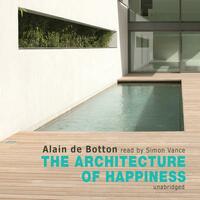Take a photo of a barcode or cover
slow-paced
informative
inspiring
reflective
medium-paced
informative
reflective
slow-paced
Plus léger que je m'y attendais, mais les exemples sont bien choisi, avec illustration pour chaque point. Le propos amène à réflexion.
AdB is an author I love to read and I've never regretted reading one of his books. This one was good, but felt a little under-researched at times. Specifically, the section on Japanese architecture was critical without convincing me that he'd really done enough to understand the place. I would have expected discussion of building codes, seismic engineering, disposable architecture, cultural desires to conform vs. differentiate, etc., etc. None of that expected discussion happened. Instead, the discussion of Japanese architecture felt like it was based on a two-week visit. Very disappointing!
I also found myself disappointed by the way the discussion was centered on how architecture makes a building's users feel, without enough discussion of other stakeholders who are impacted by architecture. What of the trees, animals, and other living things displaced by our buildings? Are they not included in the karmic accounting of "happiness" produced by a building? How about attempts to reconcile the carbon footprint of construction with the reality of our climate change predicament? The book's scope was necessarily narrow, but ultimately felt too narrow to be entirely satisfying.
I also found myself disappointed by the way the discussion was centered on how architecture makes a building's users feel, without enough discussion of other stakeholders who are impacted by architecture. What of the trees, animals, and other living things displaced by our buildings? Are they not included in the karmic accounting of "happiness" produced by a building? How about attempts to reconcile the carbon footprint of construction with the reality of our climate change predicament? The book's scope was necessarily narrow, but ultimately felt too narrow to be entirely satisfying.
informative
reflective
slow-paced
When I started reading I thought this was my first A de B book, but I remember now I tried to read The Art of Travel and had largely the same objections. Mainly, that Alain de Botton has somehow convinced everyone that because he is cynical and wordy he's saying something worth listening to.
I will freely admit that maybe I'm just not smart enough for this book, but I find myself disagreeing with almost every assertion he makes. It can be, he claims, "hard to walk into a freshly decorated house without feeling pre-emptively sad at the decay impatiently waiting to begin". Wha...? I have never in my life walked into a home, or any other sort of building, and thought, "meh, can't enjoy this, in a decade or two it might not be so pretty". Soon afterwards he says that when we speak of being "moved" by a building "we allude to a bitter-sweet feeling of contrast between the noble qualities written into a structure and the sadder wider reality within which we know them to exist. A lump rises in our throat at the sight of beauty from an implicit knowledge that the happiness it hints at is the exception."
Again, wha...? Can one not enjoy beauty simply because it is beautiful? Beauty is largely fleeting, yes, but this assumption that the universal experience is to appreciate a well-designed or beautifully decorated building only through the lens of "too bad the whole world isn't like this" is presumptuous and unnecessarily negative.
I will freely admit that maybe I'm just not smart enough for this book, but I find myself disagreeing with almost every assertion he makes. It can be, he claims, "hard to walk into a freshly decorated house without feeling pre-emptively sad at the decay impatiently waiting to begin". Wha...? I have never in my life walked into a home, or any other sort of building, and thought, "meh, can't enjoy this, in a decade or two it might not be so pretty". Soon afterwards he says that when we speak of being "moved" by a building "we allude to a bitter-sweet feeling of contrast between the noble qualities written into a structure and the sadder wider reality within which we know them to exist. A lump rises in our throat at the sight of beauty from an implicit knowledge that the happiness it hints at is the exception."
Again, wha...? Can one not enjoy beauty simply because it is beautiful? Beauty is largely fleeting, yes, but this assumption that the universal experience is to appreciate a well-designed or beautifully decorated building only through the lens of "too bad the whole world isn't like this" is presumptuous and unnecessarily negative.
Alain de Botton just never disappoints. He has changed the way I think about a number of things and I'm better off for it. In The Architecture of Happiness there are no revolutionary notions but it opens the mind and the senses for beauty on several levels.
I took my time with this book. I think that is what de Botton intended. The essays are sometimes no more than two paragraphs, but each and every one packs a punch. I highlighted something on almost every page of this book. Much more than architecture, but general aesthetics, human psychology, and history. Once again, de Botton proves himself as a brilliant observer and writer.
informative
lighthearted
reflective
fast-paced



